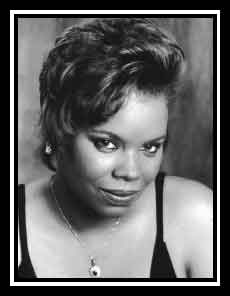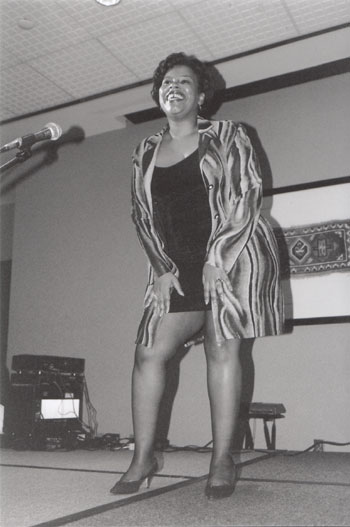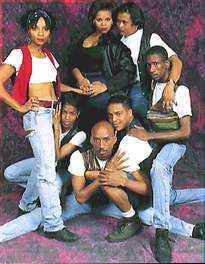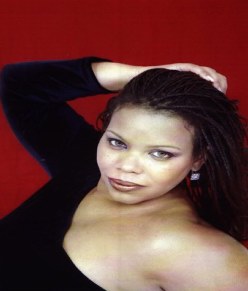|
 C.C. Carter C.C. Carter
C.C. Carter is a writer, poet, performance artist and an Adjunct Professor of Contemporary Literature. She
is a graduate of Spelman College in Atlanta, GA, and after earning her MA in Creative Writing from Queens College in New York,
she relocated to Chicago where she burst on the poetry scene. She has won numerous competitions around the country including:
The Fifth Annual Gwendolyn Brooks Poetry Competition, and The First Annual Poetry Slam at the Lambda Book Report Literary
Conference in Washington. Her work has appeared in Common Lives, Lesbian Lives, Blacklines Magazine, and has
been featured in the Bailiwick Arts Center's Pride Series.
C. C. has received numerous awards for her work including the Black Heart Award from Blacklines Magazine
and Wordrising, "for knowing how to turn on a crowd and build self-esteem," was nominated Female of the Year,
and is featured in Venus Magazine as one of Chicago's Leading Ladies.
C. C.'s published works include Letters To My Lover and Many Phases of Womanhood. Her other artistic activities
include two films: Leaving The Shadows Behind and Living With Pride: Ruth Ellis @ 100 (CC played Babe).
 C.C. is the
Women's Component Director of A Real Read's Performance Ensemble. Since the ensemble's formation she has performed in all
of their productions, both locally and nationally. C.C. also designed costuming for A Real Read presents A Real Read,
Love Can Sometimes Be..., Home For The Holidays, and the Milwaukee debut of Comin' Straight At 'Cha. She has
opened for Sharon Bridgforth's Root Wy'mn at the Randolph Street Art Gallery, played MC in Larry Duckett's We Heard
The Night Outside at the Bailiwick Repertory, at The Lammies Literary Book Review Awards, and was the opening act for
BGM recording artist Nedra Johnson. C.C. is the
Women's Component Director of A Real Read's Performance Ensemble. Since the ensemble's formation she has performed in all
of their productions, both locally and nationally. C.C. also designed costuming for A Real Read presents A Real Read,
Love Can Sometimes Be..., Home For The Holidays, and the Milwaukee debut of Comin' Straight At 'Cha. She has
opened for Sharon Bridgforth's Root Wy'mn at the Randolph Street Art Gallery, played MC in Larry Duckett's We Heard
The Night Outside at the Bailiwick Repertory, at The Lammies Literary Book Review Awards, and was the opening act for
BGM recording artist Nedra Johnson.
Perhaps C. C.'s most acclaimed work is "Herstory of my hips." C. C. says: "It was a self-esteem
enhancer, it was never meant to be performed. It's dedicated to women who are full figured, women who had to hear what I had
to hear, and thought it was bad to be us. There is nothing wrong with having hips. My grandmother once told me, 'there is
nothing wrong with carrying your history on your back, you have a legacy to history.' I use my work to touch women, if you
happen to be lesbian or transgender, or whatever, however YOU identify yourself." Speaking of her philosophy of life,
C.C. says: "Women are God's gift for womanity. God in all her ultimate wisdom knew that we were precious elements, so she
made us to be her diamond necklaces, ruby bracelets, and onyx broaches--knowing that we were created to shine and adorn while
here on earth."
She was also in the short film, Kevin's Room and scripted and adapted for stage Say Jesus and Come
to Me from the novel by Ann Allen-Shockley.
CC Carter released her much-anticipated collection of poetry– Body Language (Wildheart Press).
 Interview with C.C. Carter Interview with C.C. Carter
(Chicago Outlines -- 2000)
The Rainbow was Enuf: C.C. Carter
by lorraine j. affourtit
It was the best excuse for canceling
an interview appointment I had ever heard. Chicago writer and performer C.C. Carter was becoming a grandmother on the morning
we were scheduled to meet. Her daughter Betty gave birth to a healthy baby boy on Feb. 8. When we finally interviewed a few
days later, this was the first topic of conversation:
Lorraine: So how does it feel to be a grandmother?
C.C.:
Itīs good. You know, since Iīve never had children of my own, itīs my first baby, too. Weīre all taking part.
L.A.:Are
you close to your immediate family?
C.C.: Yes, everyone is very close. We have an apartment in our basement for my
mother-in-law [Bettyīs grandmother].
L.A.: It must be nice to have family so close by.
C.C.: It is.
L.A.:
But you are originally from the East Coast. When did you decide to move to Chicago?
C.C.: Five years ago. I came to
visit. I looked across the room, and there was Verna [C.C.īs partner].
L.A.: Was that when you met her?
 C.C.: Well, we had been friends
platonically for five years, then when we had both come out of our previous relationships, we said īLetīs do it.ī I think
we originally met at the old C.K.īs. Then, Iīll never forget—on June 3, 1995, she called me to congratulate me on my
Masterīs. Thatīs when the decision happened. C.C.: Well, we had been friends
platonically for five years, then when we had both come out of our previous relationships, we said īLetīs do it.ī I think
we originally met at the old C.K.īs. Then, Iīll never forget—on June 3, 1995, she called me to congratulate me on my
Masterīs. Thatīs when the decision happened.
L.A.: And what did you think of the Midwest?
C.C.: I had lived
here before when I was a girl. I was a missionary brat—my father is a minister. We moved every five years or so. But
that time I didn't have a car, I didn't really get a chance to explore the city. I spent my teenage years in New York.
L.A.:
How was that?
C.C.: Rough. There was a lot of character-developing experiences. Iīve always been a smart kid, intellectually,
but socially, and streetwise, I learned a lot.
L.A.: How do you incorporate that history into your work?
C.C.:
Well, I deal with personal experience, and often add an element of fiction. It comes from a principal truth, but I stretch
it to make it play to the audience.
L.A.: Do you have any early literary influences?
C.C.: I've gotta say
Toni Morrison. What she can do with one line Š . I teach contemporary literature, so I have an appreciation for Joyce
and Hemingway. I look for great lines in reading. I look to be transported. I've always been interested in poetry, from a
very little girl. I remember the first thing I read—my mother gave me Phenomenal Woman by Maya Angelou. She made me
recite it every night and every morning—it was taped to my mirror.
L.A.: Obviously your mother was a strong
influence.
C.C.: My mother is Š well, back in the day they used to call them ībrick houses.ī She definitely had
a class about her, but she could move those hips. Growing up and seeing that—you know, she was a size 18. For me, there
were always issues at school, but when I came home, it was a very nurturing environment.
L.A.: Your most famous piece
has got to be īHips.ī Every performance I go to, everyone knows that piece.
C.C.: When I wrote it—that day I
had had a really bad day. It must have been something I had on. Some women don't know what they do to other women as far as
perpetuating stereotypes. I came home and I was extremely angry. The piece just came out that way. Then I performed it at
BLACKlines' 2nd anniversary. The reaction shocked me as much as it shocked everyone else to hear this piece. For me it was
just ammunition. I was talking back.
L.A.: Do you think it's important to take part in changing the body image values
for young girls and women?
C.C.: I read Audre Lordeīs Sister Outsider. That chapter about the hatred that Black women
have for each other. I mean īWhat is it about me that makes you so uncomfortable with yourself?ī Thatīs what it comes down
to. Itīs important, yes.
My new collection, Body Language, takes body parts that women tend to feel badly about and
discusses that. My daughter just had a C-section and the first thing she said was unbelievable. She said īIīm sorry I couldnīt
have the baby the right way.ī I said īDo you really think your baby is going to care that you have those staples in your belly?ī
I just wrote a piece about that.
L.A.: Have you received an encouraging response from women, especially young women?
C.C.: Well, the young ones, I have to tell you, they are more self-confident than we were. Today we see varied body
types on TV and celebrities. The women that come up to me are usually my age. And they say īThank you very much.ī
L.A.:
Tell me about your new book.
C.C.: Weīre taking advanced orders. (laughs). This book is totally honest and itīs for
women. And itīs for men. But itīs painful. My editor and publisher pulled some things out of me. Itīs new for me, getting
to the edit. Itīs real—to the core. Iīve been working on this for five years. I take the womanīs body completely apart
and try to turn it into something good.
LA: What are your expectations for the release of the book?
C.C.:
I want to win a Lammy. (laughs). I would be crazy to say that I didnīt. At the Women of Color Writersī Conference, there was
a discussion titled īGive Me Props While Iīm Still Alive.ī Nobody should die without knowing that they made a difference.
L.A.: Who made a difference to you?
C.C.: Cheryl Clark, who has since become my mentor. I needed her to know
what she did for an 18-year-old who had no Black lesbian role models. To walk past a bookstore and see in the window her book
Living as a Lesbian changed my life.
L.A.: A lot of your work is extremely personal. Do you find it difficult to share
work that is so charged or do you gain strength from its delivery?
C.C.: Itīs hard. Like the piece that I did [a re-make
of For Colored Girls Who Never Committed Suicide Because the Rainbow Was Enuf at Mountain Moving] about domestic abuse. I
am a victim of woman-on-woman domestic violence. But I had always wanted a connection to it. I never want to perform a piece
and say it by rote. When I get tired, something always happens. I performed īHipsī on the Olivia Cruise when I was just about
finished with that piece altogether. Afterwards, there was a woman in a wheelchair and her lover came up to me saying īYou
donīt know what you did for her. You have to keep performing this poem.ī And I was back there again. Youīve got to keep a
little part of the hurt, so itīs genuine. Or a little part of the joy.
L.A.: In For Colored Girls, you touch on so
many sensitive issues—racism, sexism, heterosexism, domestic abuse, butch/ femme dynamics, etc. Are you interested in
confronting the inter-relationships between these issues?
C.C.: Definitely. I think thatīs where the womenīs component
of The Real Read [a performative writersī collective] is going with our work next time. There are a lot of people interested
in the issues affecting the colored womenīs community. Affecting all communities.
L.A.: What would you most like to
do with your work, be it writing, performing, actingŠ?
C.C.: Just to point out the differences, but to get to
the core of how we are all the same. If you are domestically abused, whatever race you are, itīs the same pain. If Iīm in
love, itīs not a Black love, itīs human love. I want my work to cross all cultures and all genders. I have an obligation to
see myself as who I am. I write from the perspective of a woman who is of color and who happens to be a lesbian. But it doesnīt
have to have mono meaning. Everyone should be able to see it. Thatīs what I teach my students. Everything you read, whether
it is a science book or a novel, make it personal first. Once you make that connection, thereīs nothing you can read that
you canīt relate to.
L.A.: You are an adjunct instructor?
C.C.: Yes, I teach at South Suburban College. My
students are everyone from a 16-year-old who graduated high school early to housewives that are going back to get their degree.
They teach me something new every day. Iīve read some of the most horrific and some of the most brave writings.
L.A.:
Would you say then that writing was your first love?
C.C.: Itīs my only love. Acting is a hobby. Writing is my life.
Everything else is coincidental.
L.A.: Will you keep collaborating with the artists youīve been working with, such
as the īPoetic Provocateurs?ī
C.C.: The Poetic Provocateurs was RoiAnn Phillipsī dream. We had all kinds of ethnic
and cultural areas covered when we performed together, but we all could say īThis piece hurts, but we are going to do it anyway.ī
We will do it again. Star Gaze wants us to perform. Thereīs some talk of making it professional. Taking it on the road. (laugh)
L.A.: And then perhaps you become a mentor for some young artist looking for a role model.
C.C.: Well, I donīt
have that to offer yet. But give me five years, and you just wait. Had you asked me five years ago, I would never have told
you Iīd be where I am. But thatīs another story.
Copyright Đ 2000 Lambda Publications
Inc. All rights reserved. Lambda publishes Outlines, The Weekly Voice of the Gay, Lesbian, Bisexual and Trans Community,
Nightlines, Out Resource Guide, Clout! Business Report, Blacklines and En La Vida. 1115
W. Belmont 2D, Chicago, IL 60657; PH (773) 871-7610; FAX (773) 871-7609. Web at http://www.suba.com/~outlines/.
E-mail feedback to
Source: http://www.nolose.org/conferences/carter.html
http://www.guildcomplex.com/calendar/archive/marchapril00/cccarter.html
http://www.ladyfestmidwest.org/spokenword/carter.html
Website: http://www.cccarter.com/
Links

Visit C.C. Carter's Website
|
